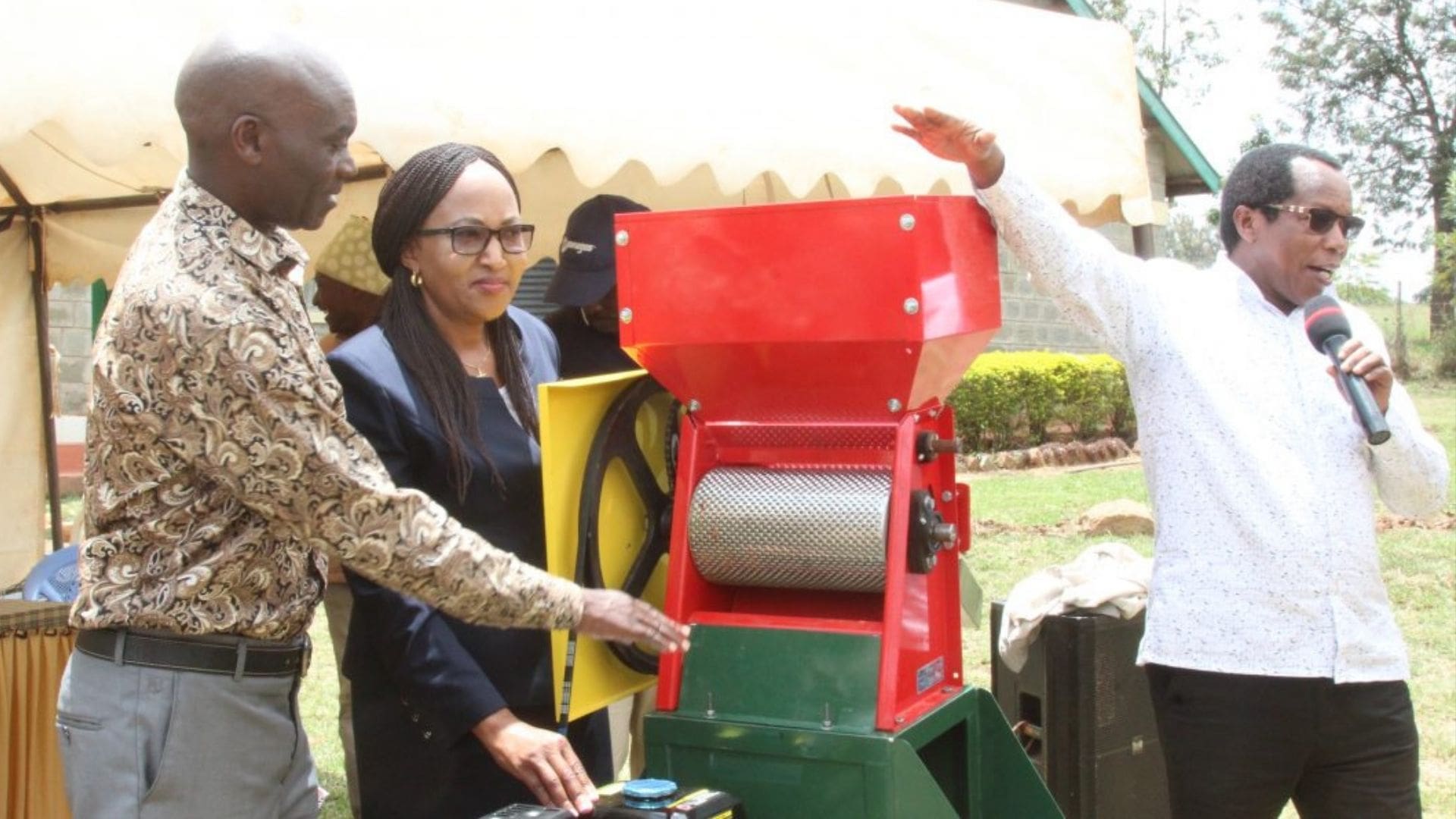Farmers To Benefit From Post-Harvest Processing Technology.
Coffee farmers in Trans Nzoia County are set to benefit from a post-harvest processing technology that will reduce losses caused by harvest wastage and rotting due to reliance on manual processes.
This is the result of a collaboration between the Trans Nzoia County Government, the Coffee Research Institute Kitale, and Penagos, a Colombian company that specializes in the production of coffee post-harvest processing machines.
Mrs Mary Nzomo, county CEC Member for Agriculture, stated during a sensitization forum that they would work closely with coffee estate farmers and coffee cooperative societies in the county to promote the best processing technologies and techniques, ensuring farmers get the best quality beans only comparable to a market leader like Colombia.
“This is good news to our coffee farmers in the county who have continued to register great interest in the coffee value chain for it will help them improve on the quality of their coffee in order to fetch better prices in the market,” said Nzomo.
She urged the county’s coffee farmers to take advantage of the partnership by joining coffee farmers’ groups for collective processing, bulking, and marketing of coffee in order to achieve high economies of scale.
The CEC stated that the county would continue to provide coffee extension services and the distribution of subsidized seedlings to support the uptake and expansion of the crop, stating that they distributed more than 10,000 subsidized coffee seedlings to farmers across the county this year as part of the crop diversification program.
“I laud the cooperation from our partners Solidaridad East Africa and CRI Kenya for walking closely with our coffee farmers and providing capacity building on coffee agronomy practices to ensure the productivity of the coffee bushes are enhanced,” she said.
Nzomo went on to say that Trans Nzoia produces the best coffee in the country and that the county is looking forward to ensuring that coffee farmers in the county sell processed, packed, and branded products directly to consumers in order for them to earn more money.
“This will see the farmers establish a brand name for the county’s coffee worldwide and this is one of the ways to attract investors into the county to put up coffee factories and processing plants,” said the CEC.
Colombian embassy representative Claudia Milena Vaca stated that coffee is one of Colombia’s most expensive products, similar to Kenya, and that small farmers produce 95 percent of the coffee in Colombia.
“There is a need to bring to your attention that Colombia is not in the country to compete but to collaborate to boost coffee production in the country,” said Milena.
She went on to say that Colombia is now producing 13 million sacks of green coffee as a result of collaboration between coffee growers and a very strong federation of coffee growers who work towards sustainability, urging coffee farmers in the country to form formidable farmers’ groups that can directly engage relevant government departments.
Milena welcomed the partnership with the county’s coffee farmers toward farm mechanization on coffee through Pengaos, noting that Colombia has made strides not only because of the factories but also through collaboration with other components that support the coffee farming industry.
According to Emmanuel Kimeu, a representative of the Coffee Research Institute, the best quality coffee from Trans Nzoia County is used by other regions to blend their quality.
He stated that the collaboration with the PENAGOS machinery company would reduce this, allowing farmers to produce the highest quality coffee.
“Sometimes farmers can produce the best coffee but during the handling and the processing period, the quality can be tampered hence compromising the quality of the coffee from the farmers,” Kimeu said.
Kimeu added that, in addition to ensuring that coffee farmers receive the best farm machinery for coffee farming, the department is also looking at efficiency and machinery that does not require a lot of energy for the farmers to operate.
“We are even looking forward to even having machinery that can be driven by solar energy because Trans Nzoia has both the rainy season and sunlight that can be generated with enough solar energy,” he said.
Kimeu also stated that CRI is providing subsidized coffee seedlings to farmers throughout the county.
He urged more farmers to embrace the crop, claiming that it now has the best selling price in the market, with farmers earning up to Sh600,000 per acre, which is far too high when compared to maize farming.
According to PENAGOS country sales representative Stephine Wainaina Kamondia, the organization began producing coffee farm machinery in 1992 with the goal of promoting agriculture by using minimal expenses for coffee processing.
Apart from providing farm machinery to coffee farmers, Kamondia stated that they also provide farmers with training on the importance of embracing coffee processing with modern equipment that uses less water and energy, claiming that many coffee farmers lose the quality of their coffee harvest due to the use of low-quality machinery.
ALSO READ:
- Sunflower Overtakes Maize Farming In Tana
- Amazing Stingray Facts
- Gov’t Efforts To Save Endangered Mountain Bongo
- Endangered Wildlife Species In Tana River
- UK Elephants To Be Flown To Kenya For Rewilding
Kamondia stated that the company has a variety of eco pulper coffee machines ranging from 300 kilograms per hour halftone, one tone 1.5 tones, 2.5, 5 tones, 7.5 tones up to 20 tons per hour, adding that this would allow both small scale and large estates farmers to choose based on their needs.
He went on to say that the company also provides after-sales services to its customers, such as when a farmer buys a machine, it is delivered to the farmer and the farmer is trained on how to use the machine.


Comments